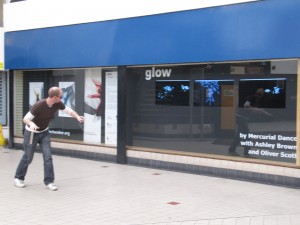@jenwood_ is investigating the cultural use of empty shops, and how council policy is affected or can be enabling. She put some questions to me about our work in the Bubble Chamber and other #emptyshops projects
 1. What are the main challenges of working with temporary or ‘meanwhile use’ of empty shops?
1. What are the main challenges of working with temporary or ‘meanwhile use’ of empty shops?
Taking on the Bubble Chamber was a big learning curve for me, as I suddenly realized I was managing a venue. This brought a whole raft of Health and Safety legislation to consider – certification, fire safety, venue risk assessments, child safety, cleaning and so on that are normally covered by the organizations/venues I work with. And on a micro budget for these elements, resourcing the time to keep on top of it all what quite a challenge. So the unseen stuff increased hugely, whilst providing a fantastic resource for making and performing.
The pop up nature can present a conundrum in itself when working project based. Will the space be let before you have time to complete your project? A potential big challenge but in this impermanence lies the beauty and immediacy of popup work.
I was fortunate my first pop up to be there for 18 months and just as the project came to an end, the shop was let successfully. This is not always the case and I was just luck.
2. How can local authorities support arts organisations to secure access to privately owned empty shops?
Good question and one I am finding out at the moment. Local Authorities can take a lead, listening and actively supporting independent ideas where they have the facility to do so. So in Coventry the Council owns a lot of property in the city centre, which has a high turnover of businesses at present, plus a lot of empty office space. If they enable pop up projects in their premises it demonstrates support, and can be used to advocate a wider approach. I believe in making the argument to the council to take a lead in terms of policy or approach will help encourage private landlord to come on board.
In terms of the practical support I think it is going to be easier to approach the landlords direct, but an introduction, when dealing with busy people in large organizations is useful. Some signposting towards the right person – which the LA should know – will go a long way.
3. How can cultural use of an empty shop contribute to regeneration of an area?
In ‘The Arcade’ in Coventry we achieved a critical mass of projects to tip the balance. When we took on a space in city arcade there was a 50% unlet space. At one point there were 5 units with cultural projects taking place, an educational start up and a couple of charity shops along side traders. By the time my premises was let, the whole arcade was occupied and traders were moving in. The council too had changed the way they were offering spaces to traders which helped new businesses.
One of the reasons my space was let was because the new business could see the potential of property from the way I had changed the space.
4. Do you think the immediacy/ beauty of the temporary nature of a pop-up could be compromised by cultural policy bureaucracy?
@jenwood_ not sure if I quite follow this question, could you expand?
@mercuriald I have found local authorities quite slow moving, and empty shops often depend on responsive quick action to make them happen..
Yes, councils and property can be slow. Lettings are usually long term decisions for organisations. – I was looking at one unit in a shopping centre and they said even for a short term let (ie fully paid up pop up use) it would take a minimum of 6 weeks to get sorted with legal. So a good policy should enable #emptyshops use and realise the benefits of a having a responsive system in place. Working in an empty shop is also about adapting ideas to suit the environment available, when it comes to arts use.



